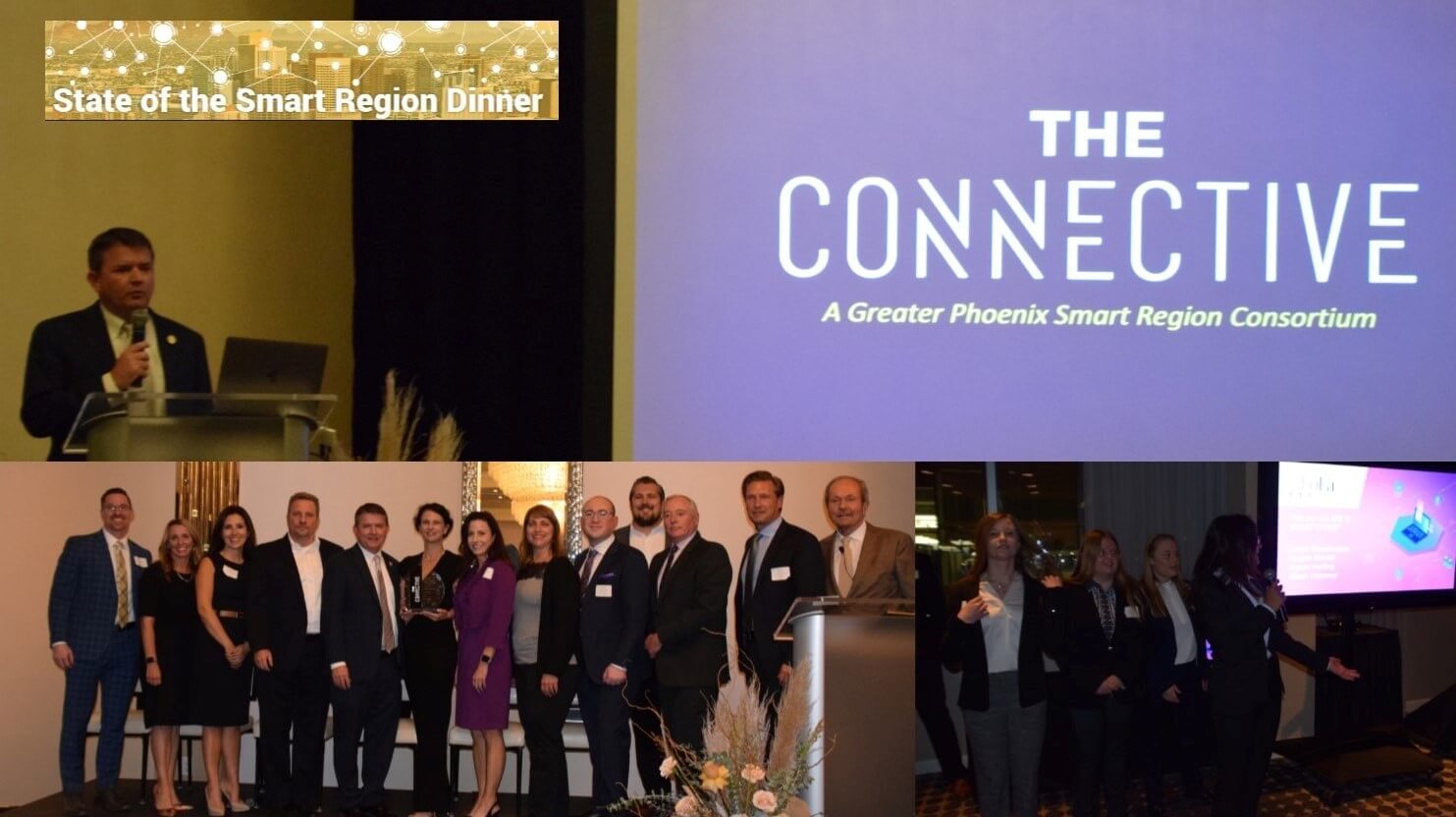
By Kirk Busch and Mark Goldstein
During the ASU Smart Region Summit in November, the formation of the statewide collaborative, The Connective, was announced at the State of the Smart Region Gala. The Connective’s vision is that through a community-driven applied research model and intentional, unprecedented collaboration, the consortium of public, private, university, and community partners will empower Greater Phoenix communities to build the nation’s largest, most connected smart region, developing and deploying technology-scalable solutions rooted in connectivity, mobility, equity, and sustainability. This constitutes a big bold new vision for Arizona!
“This is the first major regional effort in the United States to engage communities across such a broad range of municipalities in co-designing and co-investing in our smart and connected futures,” says Lev Gonick, chief information officer at Arizona State University (ASU).
While ASU is planning its own smart city project, they’re also uniting with the Arizona Institute for Digital Progress (AZiDP), Arizona Commerce Authority, Maricopa Association of Governments, Greater Phoenix Economic Council, and 22 Greater Phoenix cities and towns to create and build The Connective.
“Creating a smarter, safer, more vibrant city is at the heart of this effort. ASU is proud to partner with industry and municipalities to advance this initiative for our city, our region, and the state,” says Cynthia Sagers, vice president for research at ASU.
A day-long summit closed the SRS focusing on surfacing the big ideas and highlighting the strategic partnerships that will bring our cities and regions into the future.
Several companies have announced partnerships with The Connective, including Cox, Dell, Sprint, and SRP. Cox and ASU recently announced their plan to launch the Cox Connected Environments Collaboratory at ASU, an incubation space that will cultivate a smart region ecosystem while addressing the need for a consistent, powerful network on campus and beyond to really capitalize on the promise of these smart region initiatives. Students, faculty, and staff will develop Internet of Things (IoT) solutions to problems facing the optimization of buildings for sustainability and new way for us to interact with our evolving environment, providing new learning experiences in virtual and augmented reality, infrastructure modeling, privacy and security, sustainability, and more.
Sprint recently announced a significant collaboration to bring 5G, the Curiosity IoT Network to fruition, a whole new university degree program for IoT development.
Further, Alteryx and ASU are teaming up to use the former’s data analytics platform to effectively use data to solve smart region challenges. This partnership will give students, faculty and staff members an edge on tackling real-world business issues and driving social impact.
All of these announcements signal a substantial industry commitment to public private partnerships and improving the experience of ASU community members while broadly sharing their discoveries and forward pathways.
Bill Gates, Microsoft’s co-founder, had invested in the purchase of 25,000 acres west of the White Tank Mountains for a planned new smart city known as Belmont, and has now also invested in another 2,800 acres in Buckeye.
Belmont’s partners consider the greenfield community to be a “blank slate of opportunity” for developing advanced communication, energy, and transportation infrastructure designed for innovation and delivering an improved quality of life.
In the meantime, Microsoft Corporation has acquired three land parcels in the West Valley for enormous data center builds.
As Belmont seeks to create this forward-thinking community with its infrastructure embracing cutting-edge technology, faculty and students from ASU Sandra Day O’Connor College of Law are helping to develop a framework for governing such a smart city working alongside the Gammage & Burnham law firm. The collaborative efforts will allow students to be able to engage with people across a wide range of disciplines along with community partners and regulatory institutions.
“These students are being exposed to real estate law, development, and design with the idea of actually helping to shape this new smart city in Arizona,” says Diana Bowman, associate dean of International Engagement for the ASU Law School and co-director of the Center for Smart Cities and Regions.
Coming into 2020, two major smart region conferences are taking place here in Phoenix, Meeting of the Minds’ Innovations in Smart & Sustainable Cities Summit on Feb. 19-21, and Big Data Southwest’s National Data Center & Smart City Infrastructure Summit (#USDC20), March 11-12.
Stay tuned for future articles in the “Green Living Smart City Series” as we continue to showcase Arizona smart region initiatives and successes, as well as discuss the challenges and opportunities on the road to transforming all of Arizona into an exceptional smart and sustainable region.
Keep up with all of Green Living’s content by visiting our website.
Kirk Busch is the CEO of BigData Southwest and Chairman of Az4Solar.org. He has over 25 years of experience in the global semiconductor Industry. For the last decade, he has focused on economic development in the energy and data center industries. Busch currently serves on the board of AzSTEM, chairs the Datacenter Advisory Board at the Arizona Energy Consortium, and co-chairs the IoT-Smart City Committee at the Arizona Technology Council.
Mark Goldstein is president of the International Research Center, providing consulting, custom research, and strategic support for business, legal and public policy clients across a variety of disciplines and technology arenas since 1992. He serves on the board and executive committee of both the Arizona Technology Council and Arizona Telecommunications and Information Council, as well as involved with a number of other policy, economic development, professional, and trade groups.
Photos by Mark Goldstein






